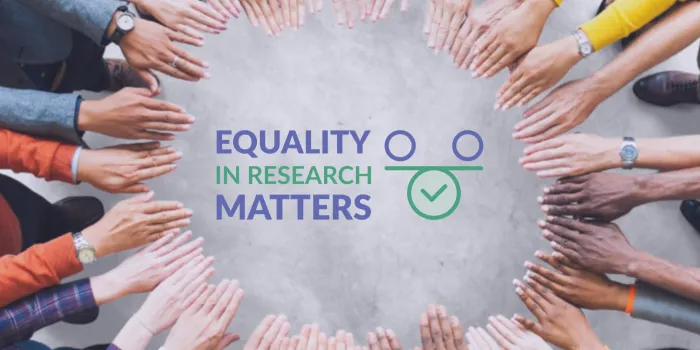
Delegates including NIHR ARC Programme Managers, Public and Patient Involvement (PPIE) Leads and researchers attended the online event hosted by NIHR ARC East Midlands in collaboration with the Centre for Ethnic Health Research.
The webinar featured three insightful presentations followed by an engaging Q&A session, covering:
- Understanding equality monitoring: Participants learned about what equality monitoring involves and why collecting this data is essential for research.
- Sharing experiences: Attendees shared their learning and experiences, fostering a collaborative environment.
- Facilitated discussion: A key part of the session involved exploring how equality monitoring data can be effectively utilised and what is expected from the NIHR.
Presentations
The event was chaired by Professor Marion Walker MBE, a leading authority in stroke rehabilitation and the Equality, Diversity and Inclusion (EDI) Committee Chair at ARC East Midlands. Her expertise guided the discussions, ensuring a productive and informative experience.
The presentation slides can be accessed below:
Key highlights
Several important topics emerged, highlighting the complexities and considerations surrounding equality monitoring data:
- Comparison to census data
Participants discussed the lack of clear guidance on how to align research data with census data, noting that geographical factors may influence this comparison. The UK Health Data Research Alliance White Paper on ethnicity data is available here.
- Equality monitoring form
The ARC East Midlands is finalising an equality monitoring form through its EDI Committee, with plans to share the final document soon. Co-produced with PPIE contributors, the forms will be updated as necessary.
- Training initiatives
The ARC East Midlands is developing training programmes focused on the collection of equality monitoring data, ensuring researchers are well-equipped. Emphasis was placed on developing training skills for researchers, particularly in communicating with participants about the reasons for data collection.
- Cultural competence training
Attendees were provided with a link to training on Cultural Competence and Effective Community Engagement offered by the Centre for Ethnic Health Research.
- Data collection and next steps
Discussions included strategies for improving processes, training and communication for researchers, as well as the differences between qualitative and quantitative data and their applications.
- Research on Gypsy and Traveller communities
Insights were shared regarding work by ARC North West Coast (NWC) at the Seldom Heard Forum, particularly focusing on data collection efforts.
- Equality impact assessment (EqiA)
The process of conducting an EqIA was discussed, emphasising the integration of nine protected characteristics and how equality monitoring data can shape and navigate this process.
- Health Research Authority (HRA) consultation
Participants were encouraged to engage in the HRA’s consultation on inclusion and diversity guidance, shaping future research standards.
- Systematic reviews
The webinar highlighted the PRO-EDI tool, aimed at improving how equity, diversity and inclusion are handled in systematic reviews.
- Baseline and equality monitoring data
The need to align baseline research data with equality monitoring data was discussed.
- Respondent privacy
The importance of addressing unknown and "prefer not to say" responses was noted, as some individuals may choose not to disclose information while others may wish to provide more.
- Epidemiology studies
The conversation included strategies for capturing equality monitoring data meaningfully in epidemiological research.
- Terminology considerations
A suggestion was made to reconsider the use of the term "ethnicity" due to the diversity of subgroups involved, such as various nationalities.
- Complexities of genetic ancestry and race
The complexity surrounding genetic ancestry and race in relation to research questions or disease areas was acknowledged, referencing a paper on potential ethnicity codes.
- Socio-economic status
The complexities and uncertainties associated with socio-economic status as a broad area of study were discussed.
- Participant burden
Concerns about the additional burden of data collection for participants and research teams were raised, with a shift in mindset encouraged to view data capture as an opportunity rather than a burden.
- Efficient data collection
The potential for double data collection was explored as a means of increasing efficiency.
- NIHR mandate for inclusion
The NIHR's new condition for funding requiring inclusive research design was highlighted, reinforcing the importance of diversity in research.
- Models of intersectionality
Intersectionality is recognised as important and requires extensive data. This approach is included in the ARC NWC’s Health Inequalities Assessment Toolkit.
Feedback
Participants provided overwhelmingly positive feedback, highlighting the clarity of the presentations and the value of open dialogue. Comments included:
- “Facilitate conversation, flag up resources, get us up to date”.
- “Very clear and helpful presentation - plenty of time for questions, with good responses”.
- “Great to have lots of time for discussion. Excellent presentations”.
- “I've attended a few of your sessions now (EQIA) and find them very valuable”.
Catch up on previous seminars
The ‘Equality in Research Matters’ campaign, launched by ARC East Midlands in collaboration with the Centre for Ethnic Health Research in 2023, aims to enhance inclusivity in health and social care research.
This initiative includes a series of webinars that address various important topics, such as:
Making an Equality Impact Assessment (EqIA) in research a reality
Social Model of Disability Seminar
Why should I carry out an Equality Impact Assessment for my research?
The full playlist of webinars is available on YouTube.
Stay connected
To stay informed about future webinars and initiatives, follow us on X @ARC_EM and @EthnicHealthRes, subscribe to our newsletter, and join the conversation using the hashtag #EqualityInResearchMatters.
